Key takeaways:
- Pro-life advocacy emphasizes the intrinsic worth of all human life and the importance of providing care and support for mothers and children.
- Isolation can distort one’s perception of reality, highlighting the necessity for community and connection to reinforce beliefs and advocacy efforts.
- Sharing personal stories fosters deeper connections and resilience among advocates, transforming feelings of isolation into a supportive network.
- Building lasting relationships through shared goals in advocacy creates a sense of belonging and empowers individuals to face challenges together.
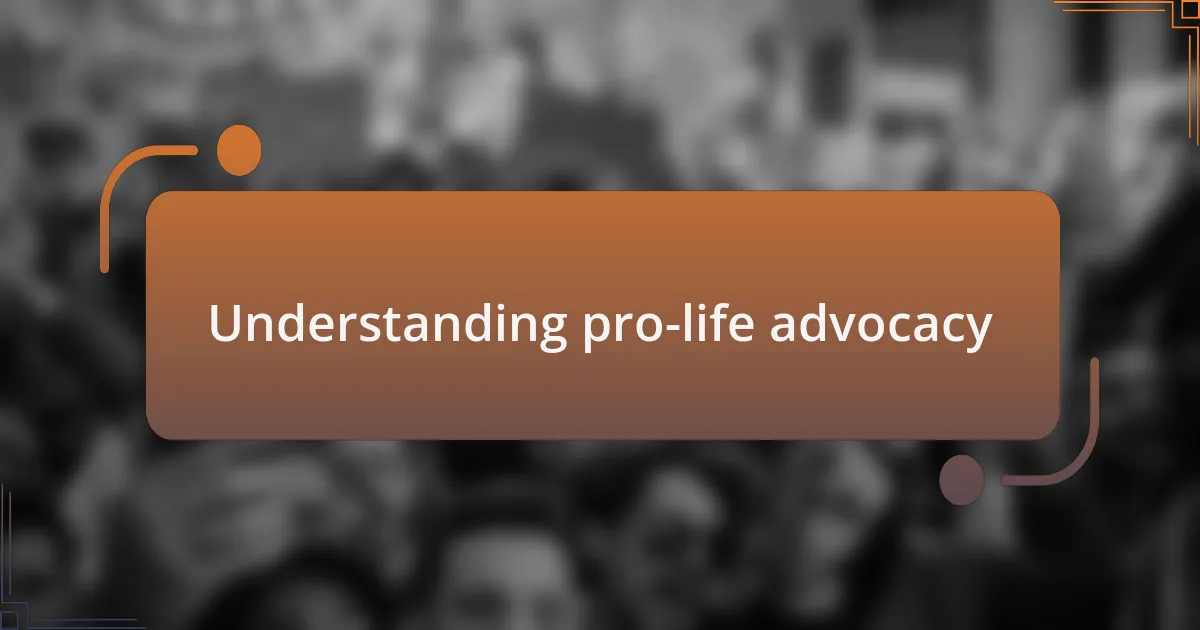
Understanding pro-life advocacy
Pro-life advocacy is fundamentally about valuing all human life from conception to natural death. I remember my first encounter with this community; it felt like stepping into a warm embrace, filled with people who shared a profound belief in the sanctity of life. Have you ever experienced a moment when you felt your voice truly mattered? That’s exactly how I felt among fellow supporters.
At its core, pro-life advocacy elevates the conversation about life and love. It pushes against societal norms that often devalue those most vulnerable, reminding us that every life has intrinsic worth. I often reflect on the stories of individuals I’ve met who faced challenges with pregnancy or disability; their resilience taught me that hope can flourish even in the darkest circumstances.
Engaging in pro-life advocacy also means grappling with difficult questions about ethics and rights. I often ask myself, what does it mean to truly support life? For me, it extends beyond the womb; it means providing care, education, and compassion for both mothers and children. Each narrative I’ve heard reinforces the importance of our mission and deepens my understanding of the complexities surrounding life choices.
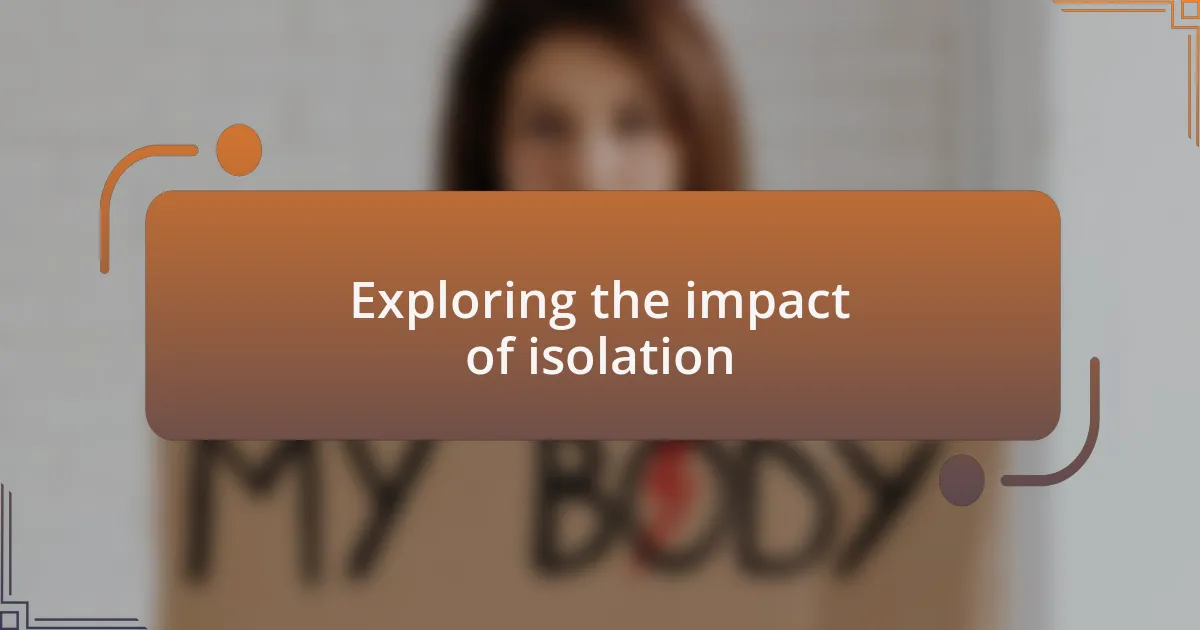
Exploring the impact of isolation
The experience of isolation can be profoundly disorienting. I remember a time when I felt completely alone in my pro-life beliefs, surrounded by voices that not only disagreed with me but actively dismissed the value of life. That period was a reminder of how disconnecting it can feel when you believe in something deeply, yet find no one to share that conviction with.
Isolation doesn’t just impact our mental health; it can also skew our perception of reality. During my lonely days, I noticed how easy it was to spiral into negative thoughts, doubting my own beliefs about the sanctity of life. Have you ever found yourself questioning your values simply because you felt unheard? For me, it was a pivotal moment that highlighted the need for connection and community, which are vital for reinforcing one’s convictions.
As I navigated my feelings of solitude, I learned that sharing experiences can transform isolation into strength. One evening, I decided to reach out to a few friends who shared similar pro-life perspectives. Just discussing our collective challenges and triumphs created an uplifting atmosphere that reignited my passion. It’s astonishing how the act of connecting can shift our mindset and remind us that we are not alone in our advocacy.
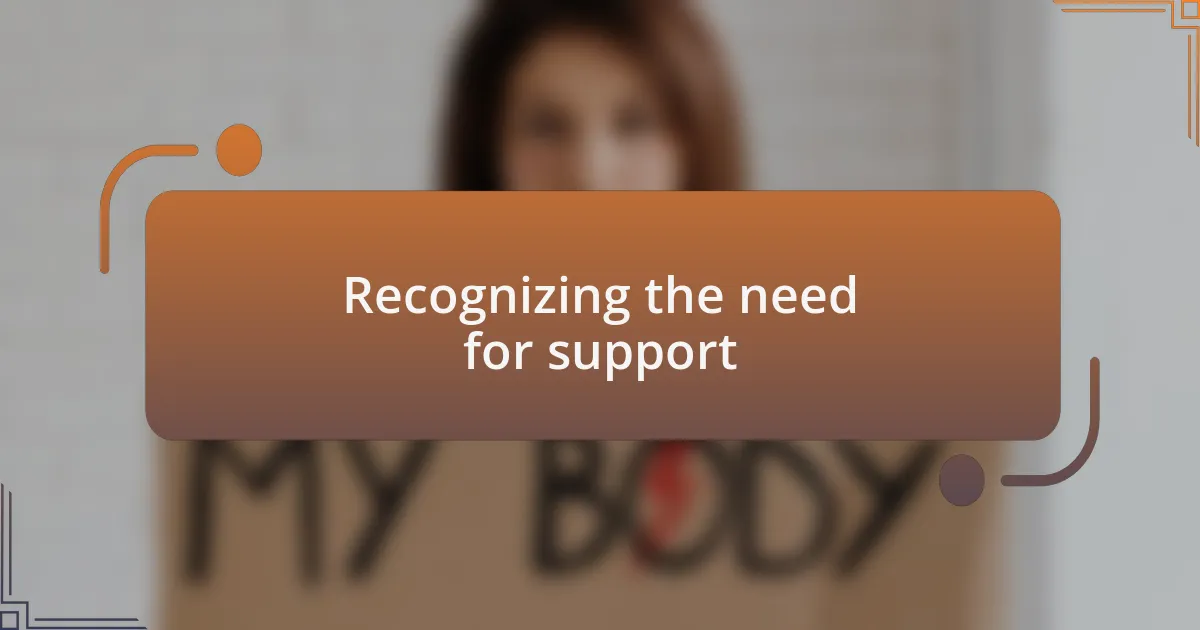
Recognizing the need for support
Recognizing the need for support often begins with a moment of vulnerability. I recall sitting by myself after a challenging pro-life discussion, feeling as if I was carrying the weight of my convictions alone. That heaviness eventually led me to reflect: if I was struggling with these feelings, how many others might be experiencing the same isolation?
As I connected with like-minded individuals, I understood that seeking support is not a sign of weakness; instead, it’s an act of courage. There was a time when I hesitated to share my thoughts, fearing judgment from others. However, I discovered that opening up about my struggles not only lightened my burden but also allowed others to feel seen and heard. Have you ever shared your experiences only to realize that others have felt the same?
In my journey, recognizing the need for support meant embracing the idea that community fosters resilience. Engaging in conversations with others has illuminated just how essential it is to cultivate connections. I often remind myself that there’s a shared strength in our collective voices; together, we can energize and uplift one another, keeping our commitment to advocacy vibrant even in challenging times.
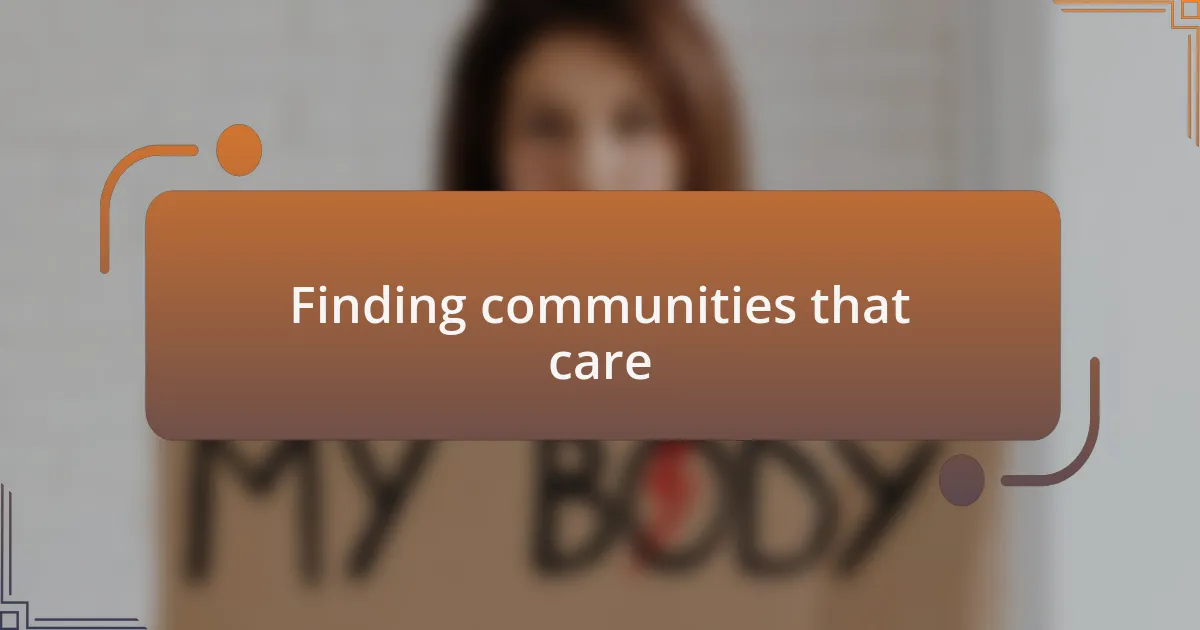
Finding communities that care
Finding communities that genuinely care has been a transformative experience for me. Early in my advocacy journey, I stumbled upon an online forum dedicated to pro-life discussions. It was heartening to see people from various backgrounds come together, sharing not just their thoughts but also their personal stories. I quickly realized that these platforms weren’t just places for debate; they were havens for connection, where our collective passion created a supportive atmosphere.
One memorable encounter involved a virtual meeting where a woman shared her story of unexpected pregnancy amidst adversity. I could see the struggle in her face through the screen, and it resonated deeply with my own experiences. It’s intriguing how a single conversation can ignite a sense of belonging. Have you ever felt that electricity when someone articulates your unspoken feelings? I found that in these communities, I wasn’t just a voice—I was part of something greater, a tapestry of shared struggles and victories.
As I participated more actively, I discovered local community groups that extend beyond the digital realm. Attending events, I felt warmth and camaraderie—individuals who weren’t afraid to stand up for their beliefs and support one another. These gatherings reinforced my conviction that we heal and grow together. Are you ready to seek out people who share your commitment? Embracing these connections has not only enriched my advocacy but also reminded me that there’s strength in unity.
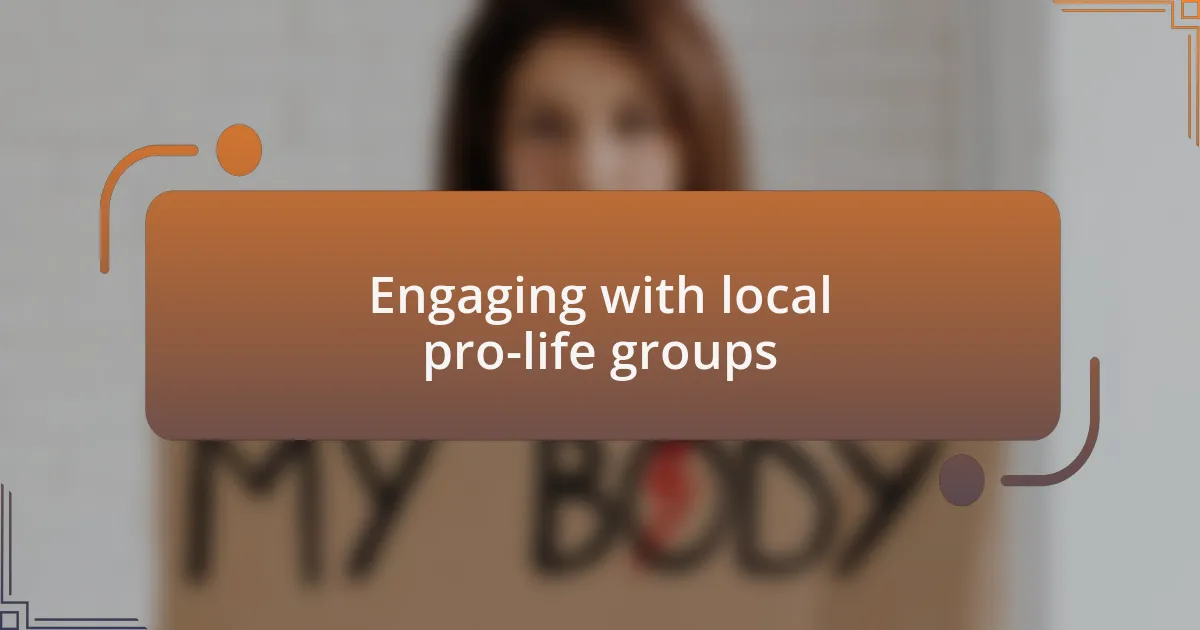
Engaging with local pro-life groups
Engaging with local pro-life groups has been a pivotal aspect of my journey. I remember attending my first community meeting, feeling a mix of excitement and nervousness. The moment I stepped into the room, the warmth of the familiar faces reassured me. It was as if I had finally found my tribe, a group that not only shared my convictions but also provided a platform for meaningful dialogue. Have you ever walked into a place and felt an instant connection? For me, that was the beginning of something special.
One evening, I joined a volunteer initiative organized by a nearby pro-life group. We worked together on a community outreach campaign, handing out informative brochures and engaging with passersby. The sense of purpose was electric, fueling my passion and filling my heart with hope. I’d never experienced such solidarity before. Each conversation with strangers who expressed curiosity felt like planting seeds of understanding. Have you ever thought about how one small interaction could lead to profound change? It’s remarkable to witness the ripple effect of these efforts.
Through these interactions, I’ve forged lasting friendships that transformed my outlook on advocacy. I often find myself reflecting on our shared experiences during those late-night discussions, where we exchanged strategies and supported each other through challenges. This sense of camaraderie not only alleviated my feelings of isolation but also deepened my commitment to the cause. How can we expect to make a difference without those who understand our journey? Engaging with local groups fosters a culture of support that empowers us to stand strong together.
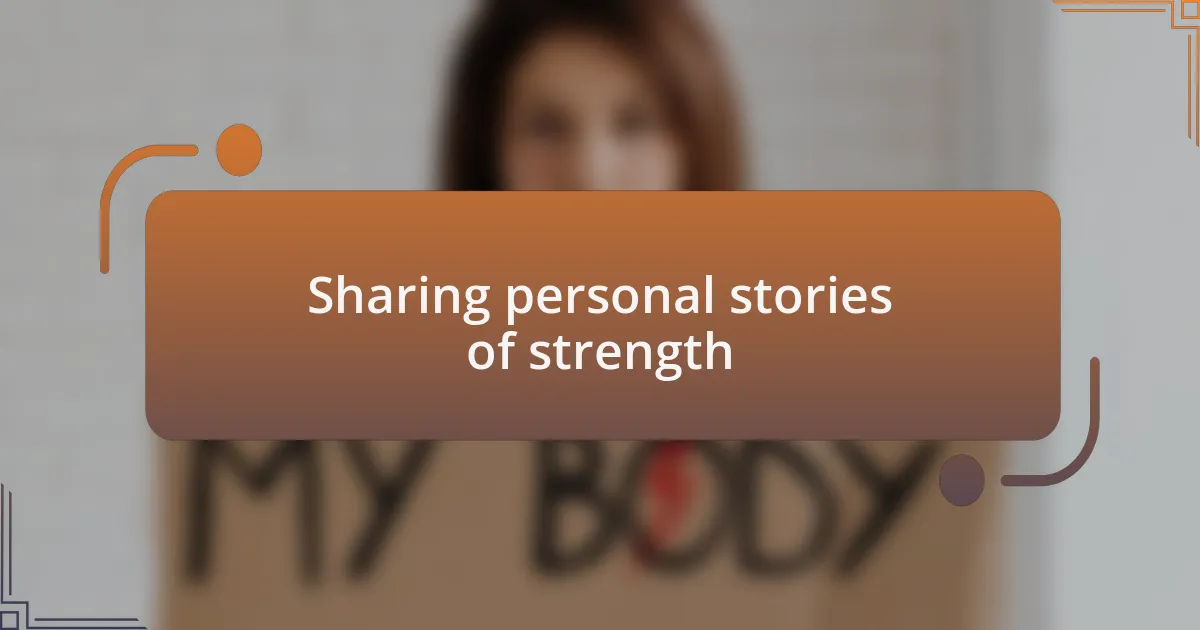
Sharing personal stories of strength
Sharing personal stories can be incredibly powerful. I remember a time when I felt utterly alone in my beliefs, grappling with feelings of doubt and fear. It was during one of our pro-life meetings that a fellow member shared her story of unexpected pregnancy and the support she received that made a turning point in her life. Listening to her journey resonated deeply with me and reminded me that my struggles were not mine alone – they were shared by many.
One evening, as I shared my personal experience about feeling pressured to conform to societal norms, the room fell silent. I could see nods of understanding, and that’s when I realized how vital it was to express our vulnerabilities. Sharing my story not only lifted a weight off my shoulders but also opened a floodgate for others. Had I known that my voice could inspire someone else, I would have spoken sooner. That night, we formed deeper connections, discussing our heartfelt journeys and drawing strength from one another’s courage.
I recall standing outside after that meeting, surrounded by newfound friends, each recounting their battles with isolation and stigma. It struck me that in sharing our personal stories, we weren’t just recounting struggles; we were weaving a tapestry of resilience. How can we truly understand each other’s experiences without first opening our hearts? It became clear to me that these stories not only heal but also fortify our commitment to the pro-life movement, reminding us we are never alone in our pursuit of compassion and advocacy.
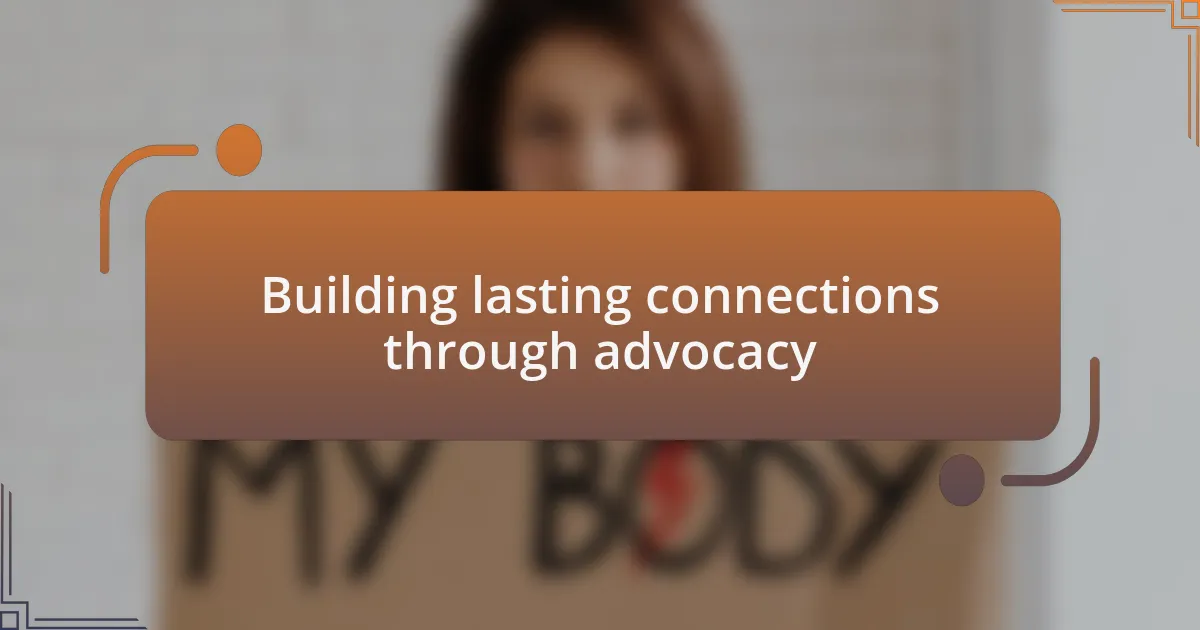
Building lasting connections through advocacy
Building lasting connections often begins with shared goals and values. In my early days of advocacy, I found that working alongside others who were passionate about the pro-life cause created bonds that became personal and meaningful. Once, during a community outreach event, I teamed up with someone I hardly knew. As we discussed our motivations for being there, I discovered we both had similar family backgrounds and experiences that shaped our beliefs. That conversation sparked a friendship that has lasted through countless campaigns and discussions.
Have you ever felt a rush of excitement when meeting someone who just gets it? I remember attending a regional conference where I met an advocate who had faced unimaginable challenges. She shared how her advocacy work not only fueled her passion but also provided her with a sense of belonging. It was remarkable to see how our shared purpose brought us together, creating a network that encourages growth and empowerment. The beauty lies in knowing that there’s strength in unity; our individual journeys contribute to a larger narrative that uplifts everyone involved.
Through these experiences, I’ve realized that lasting connections are nurtured not just in moments of triumph but also during times of vulnerability. I once attended a small gathering where we discussed the struggles we faced in our advocacy. A participant shared her story of rejection from family due to her pro-life views. As she spoke, an unexpected warmth filled the room, reminding us that connecting authentically often means embracing our shared sorrows. Together, we wove a fabric of support that made us all feel less isolated. Isn’t it incredible how advocacy can turn strangers into friends, united by purpose and compassion?